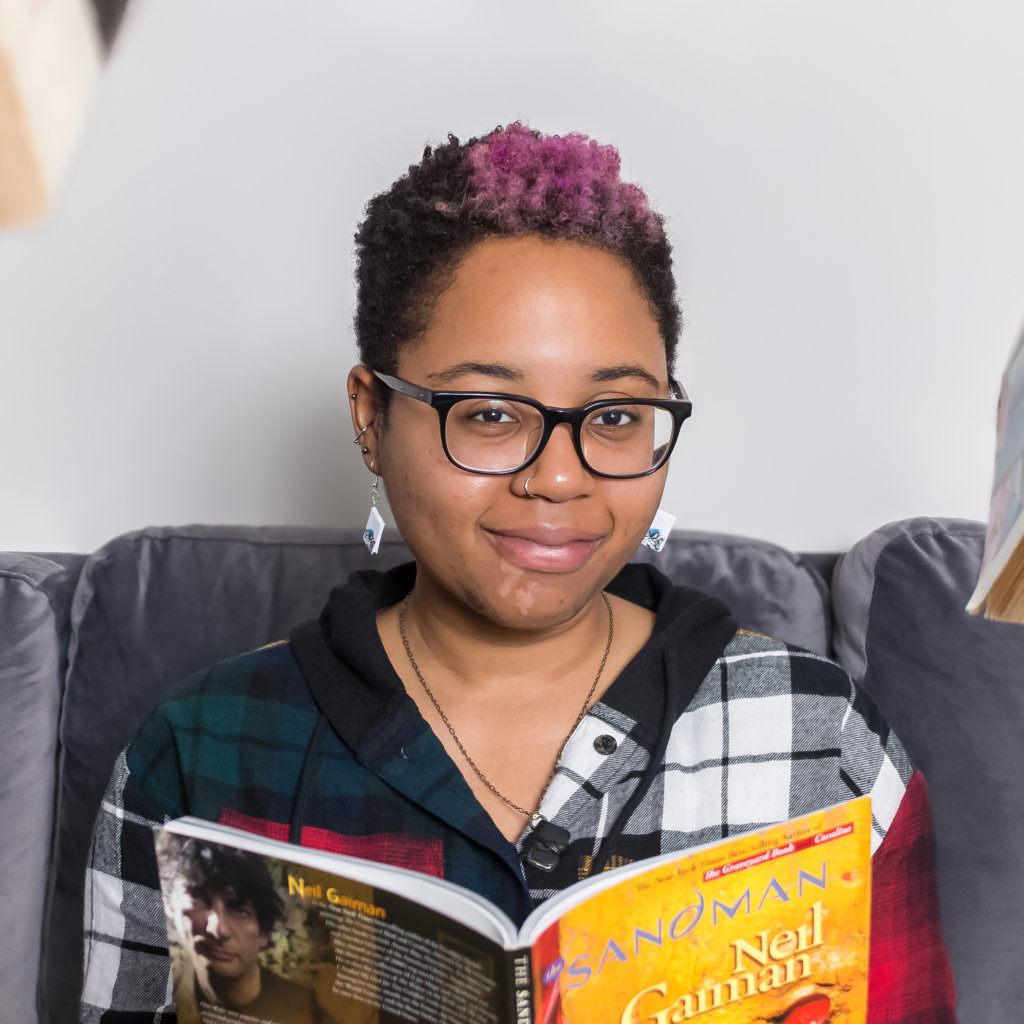Maud Newton, author of Ancestor Trouble
Random House | March 29
Maud Newton made a name for herself back in 2002 as one of the very first book bloggers, drawing a large audience with her blend of cultural criticism and personal writing about her family tree. Now her first book, Ancestor Trouble, will develop those early musings into their fullest forms, using the lens of Newton’s family (including her Confederate heritage-obsessed father and a grandfather who got married 13 times) to examine the wider world of genetics, intergenerational trauma and family secrets, both buried and spilled. Her approach is sweeping, even exhaustive, but Newton is a master at taking a complex, far-reaching topic and making it magnificently intimate.
M.E. Hilliard, author of Shadow in the Glass
Crooked Lane | April 5
A working librarian who grew up on the Connecticut coast, M.E. Hilliard brings her professional and personal expertise to bear in the Greer Hogan mysteries, the rare cozy series that can be legitimately described as “edgy.” The standard elements are all there—a beautiful small-town setting in New England, a clever and resourceful heroine—but there’s a pleasing strain of darkness running through the proceedings. Hilliard’s debut, The Unkindness of Ravens, won rave reviews across the board, and Shadow in the Glass is bound to lure even more readers to her chilly, ceaselessly clever take on the classic cozy.
Bonnie Garmus, author of Lessons in Chemistry
Doubleday | April 5
California-born, London-based author Bonnie Garmus’ first novel, Lessons in Chemistry, made waves when it sold in a 16-publisher auction, and now Brie Larson is set to star in and executive produce the Apple TV+ series adaptation. That’s a whole lot of hype, but the great news is that Garmus’ novel delivers on its promises in depicting the ups and downs in the life of chemist and cooking show host Elizabeth Zott. Plus, Garmus seems like someone we’d like to be friends with: copywriter, creative director, open-water swimmer, rower and mother with a background in tech and science and a real knack for naming dogs. (The dog in Lessons in Chemistry is named Six-Thirty, and the author’s own is named 99.)
Kris Ripper, author of Book Boyfriend
Carina Adores | April 26
The extremely prolific Kris Ripper became one of the genre’s rising stars with The Love Study series, a charming, nuanced look at modern love that boasted an enviable and highly entertaining friend group. Ripper’s next book, Book Boyfriend, offers a charmingly meta wrinkle to the always popular subgenre of romances set in the literary world. PK is a writer who has been in love with his best friend, Art, for years. He pours all of his feelings into his work, creating a novel in which a fictionalized version of himself is the perfect partner (aka a “book boyfriend,” a romance term used to refer to characters that readers would love to date in real life).
Shelby Van Pelt, author of Remarkably Bright Creatures
Ecco | May 3
First-time novelist and Pacific Northwest native Shelby Van Pelt arrives with the year’s most anticipated animal narrator: Marcellus, an Ove-style curmudgeon that just so happens to be a highly observant giant Pacific octopus living in an aquarium. Van Pelt has combined My Octopus Teacher with a drama involving an elderly woman’s search for her missing son, resulting in a novel that aims for the book club sweet spot.
Putsata Reang, author of Ma and Me
MCD | May 17
When journalist Putsata Reang was less than a year old, she spent 23 days on a crowded boat with her mother as refugees fleeing Cambodia. Sanctuary was eventually offered in the Philippines, where Reang’s mother rushed her sick baby to a military doctor, who saved Reang’s life. This is the debt Reang owes her mother—and this is the reason Reang felt her mother’s disappointment so acutely when Reang came out as a lesbian and her mother severed the relationship. Ma and Me is an important new entry in the growing body of American refugee and immigrant literature, shining a light on the experiences of queer people whose families have survived the trauma of war.
Kirstin Chen, author of Counterfeit
William Morrow | June 7
Award-winning author Kirstin Chen’s first two novels, Soy Sauce for Beginners and Bury What We Cannot Take, received several “best books” nods and plenty of critical love, but her third novel, Counterfeit, is her first from a traditional publisher, which means that a whole new section of the reading public will finally get the chance to discover her. To tell the story of two Asian American women who band together in a counterfeit handbag scheme, Chen undertook a research trip to Guangdong, China, to witness the industry of luxury brand “superfakes.” It’s a juicy premise, so of course TV rights have already been sold, with Chen set to executive produce. Born and raised in Singapore, Chen currently lives in San Francisco, and she teaches creative writing at the University of San Francisco and in Ashland University’s Low-Residency MFA Program.
Kali Fajardo-Anstine, author of Woman of Light
One World | June 7
No doubt about it, Colorado-based author Kali Fajardo-Anstine’s star is rising. Her 2019 short story collection, Sabrina & Corina, won an American Book Award and was a finalist for the National Book Award, the PEN/Bingham Prize and the Story Prize, which means that her first novel, Woman of Light, is really exciting in a “if you know, you know” sort of way. It’s a multigenerational epic set in the American West from 1890 to 1935, following an Indigenous Chicano family throughout five generations. Fajardo-Anstine earned her MFA from the University of Wyoming and is the 2022/2023 Endowed Chair of Creative Writing at Texas State University.
Nekesa Afia, author of Harlem Sunset
Berkley | June 28
It’s hard to write a good historical mystery. Authors must manage all the spinning plates of a good whodunit (premise, red herrings, pacing of clues, etc.), while also wrestling with the knotty questions of historical fiction. Can they evoke the feeling of an era while still making it accessible to modern readers, and successfully highlight both the fun and glamour and the inequalities and issues of the day? In her roaring ’20s historical mystery debut, Dead Dead Girls, Nekesa Afia succeeded at all of the above and introduced a complicated, perfectly crafted sleuth to boot. No surprise the book became a word-of-mouth hit. We expect that Harlem Sunset will introduce even more readers to Afia and her fashionable heroine, Louise Lovie Lloyd.
CJ Hauser, author of The Crane Wife
Doubleday | July 12
Novelist CJ Hauser (Family of Origin, The From-Aways) struck it big in 2019 with her Paris Review essay “The Crane Wife,” which has since been read by over a million people. Now her debut work of nonfiction will take the eponymous viral essay—about traveling to Texas to study whooping cranes 10 days after calling off her wedding—and enlarge its scope with 17 additional pieces that explore how to cultivate an unconventional life, from robot conventions, to weddings, to John Belushi’s grave. As a fiction writer, Hauser’s work is smart, surprising and irresistibly weird—and now, as an essayist, perhaps doubly so.
Isaac Fitzgerald, author of Dirtbag, Massachusetts
Bloomsbury | July 19
Isaac Fitzgerald has been a man about book-town for years: He’s the founding editor of Buzzfeed Books, a bestselling children’s book author, an essayist, a co-author of art books about tattoos and a frequent “Today” show guest. Dirtbag, Massachusetts marks his grand entry into one of the few book-town neighborhoods where he hasn’t yet set up shop: prose books for adults. Fitzgerald’s memoir-in-essays will chart his rough-and-tumble upbringing in Boston and rural Massachusetts and the choppy waters of his West Coast adulthood, learning to navigate the pitfalls of masculinity, body image, class and family strife. There will be tough stops along this journey—including discussions of violence, homelessness and trauma—but we suspect Fitzgerald’s signature tenderness, humor and generosity will carry readers gently the whole way.
Alexandra Rowland, author of A Taste of Gold and Iron
Tordotcom | August 30
Fantasy romance is absolutely huge right now, to the point that it can be hard to stand out among the flood of gorgeously crafted tales of star-crossed lovers or rival princes. But standing out has not been a problem for Alexandra Rowland. Their Conspiracy of Truths duology was funny, moving and profound in equal measure, thematically ambitious but still deeply rooted in the personal experiences of its characters. We expect even more from A Taste of Gold and Iron, a standalone fantasy romance set in a world inspired by the Ottoman Empire. This tale of a prince and his bodyguard falling in love while untangling a plot that threatens their kingdom and promises to be a feast that satisfies both emotionally and intellectually.
Maya Phillips, author of Nerd
Atria | October 11
Poet and New York Times critic at large Maya Phillips will breathe new life into the ever-popular subject of fandom in her prose debut, Nerd: Adventures in Fandom From This Universe to the Multiverse. Growing up in the 1990s, Phillips cut her teeth on narrative greats such as Star Wars, Harry Potter, “Doctor Who” and “Buffy the Vampire Slayer.” As she teases apart how these franchises and others formed her identity, worldview and media appetites, her experiences as a Black woman and chops as a professional film and TV critic elevate each essay above the typical fandom fray. Nerd will lend weight to a sometimes-flighty sector of cultural criticism and establish Phillips as a true contender.
Newton author photo by Maximus Clarke. Garmus author photo by Serena Bolton. Van Pelt author photo by Karen Forsythe. Reang photo by Kim Oanh Nguyen. Chen photo by Sarah Deragon. Fajardo-Anstine photo by Estevan Ruiz. Afia photo by FizCo Photography. Hauser photo by Shannon Taggart. Fitzgerald photo by Maddie McGarvey. Rowland by Charles Darrel. Phillips photo by Brian Goldfarb.










































